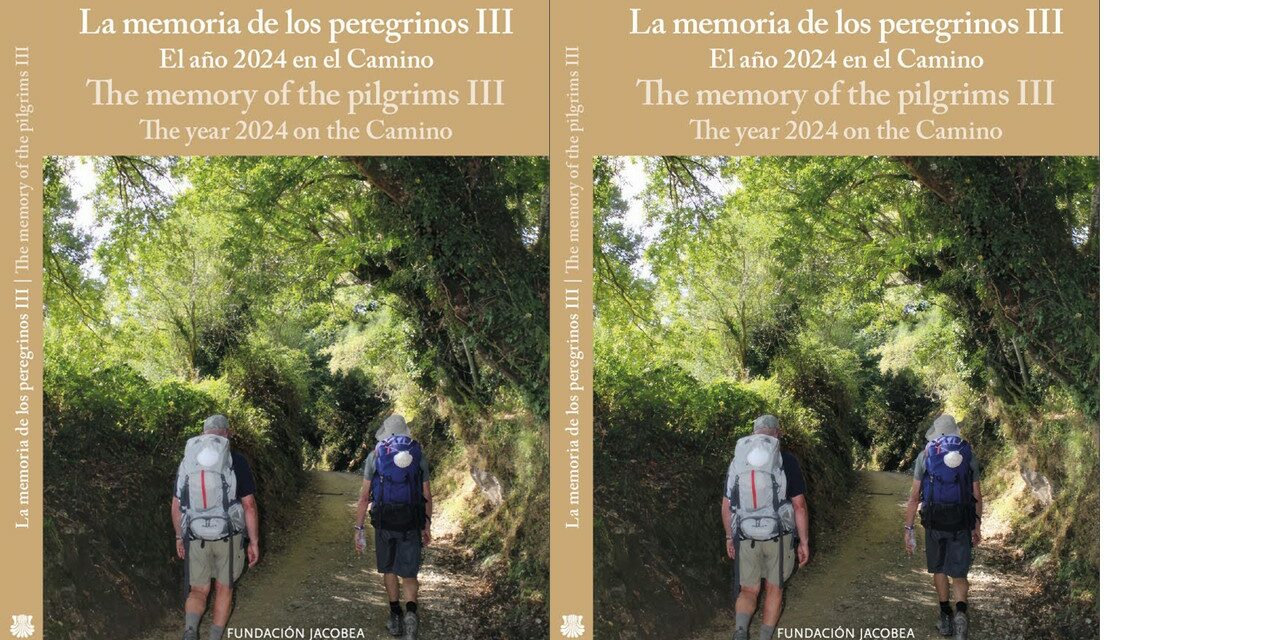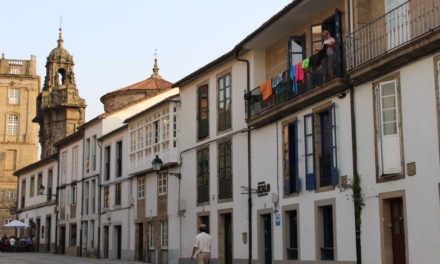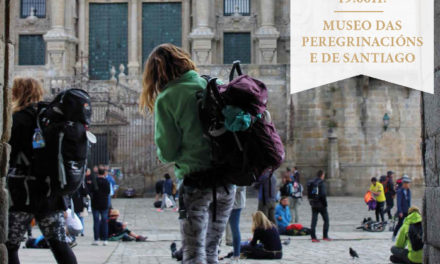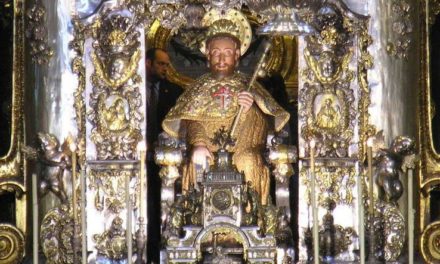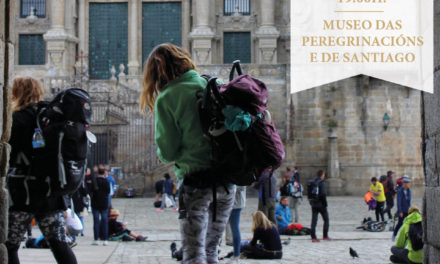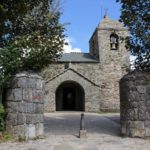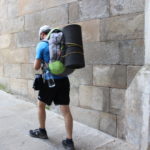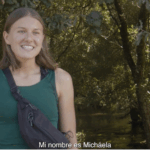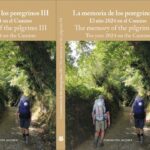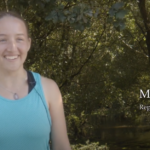This year 2024, the Fundación Jacobea celebrates its first five years of work with pilgrims, a celebration that allows us to take a brief look at our first five years of history.
Although it was in 2019 when our first project saw the light – The memory of the pilgrims I – the Fundación Jacobea had been founded years before by the Carrís Group, with the aim of promoting cultural, artistic, historical heritage and the defence of the environment, as well as promoting local-social and economic development within the framework of the Pilgrimage Routes. To this objective were added a series of more specific purposes that, in some way, already defined the content of future projects: attention to the cultural heritage of the pilgrimage itineraries of the Camino de Santiago, particularly the intangible; the promotion and enhancement of the attention and reception of pilgrims and visitors to the Caminos de Santiago; and the promotion and development of the values of the world of pilgrimage: hospitality, solidarity, perseverance, austerity, effort, desire for improvement, rationalization when making decisions.
Precisely the last goal mentioned, that of spreading the values of the Camino, shaped the project that we celebrate today, because, to the question of how to promote the values of the Camino, we answered without hesitation: collecting pilgrimage experiences. The testimonies of pilgrims show these values, they offer future pilgrims or anyone interested in the phenomenon of the Camino de Santiago examples of what is at stake in the pilgrimage to Compostela. The choice was made and five years later, those of us who work or are linked to the Foundation continue to congratulate ourselves for it.
Dedicating our work to the human element of the Camino de Santiago, placing the pilgrim at the centre of our projects, was a great success, we thought so then and we continue to think so today, because this decision responds to the object and the aims of the Foundation, but, above all, to the desire of those who make up it. Thus was born our project The Memory of Pilgrims, a generic title under which we have grouped a series of actions that always have the pilgrims and the values of the Camino that they embody as their protagonists. The format chosen has been to carry out interviews, that is, to give the pilgrim, the volunteer, the expert the floor, to collect through their testimonies the aspects of human subjectivity present in the pilgrimage to Compostela: life stories, causes or motivations for travelling the Camino de Santiago, what they have found on the Camino, the impact that the pilgrimage has on the lives of so many pilgrims, etc.
If we look in a little more detail at our brief history, we find, in 1919, the creation of an important website, important because it already has more than 750 entries, all of them with “ad hoc” content on the Camino de Santiago and the city of Compostela and, above all, with testimonies, experiences and interviews with pilgrims, heads of Jacobean Associations, experts, hospitallers and multiple figures linked to the current pilgrimages to Compostela.
Likewise, linked to this website, the social networks of the Jacobean Foundation were born and developed:
-A profile on Facebook (https://www.facebook.com/fjacobea/)
-A profile on Twitter (https://twitter.com/FJacobea)
-A profile on Instagram (https://www.instagram.com/fjacobea/)
-A channel on YouTube (https://www.youtube.com/@fundacionjacobea23)
Through this Web and Social Networks, the Jacobean Foundation has created and sustained a huge global community linked to the pilgrimage.
At the end of that same year 2019, the Foundation produced a multilingual documentary with two versions subtitled in Spanish and English. It is a documentary made up of interviews with pilgrims and central figures for the current revitalization of pilgrimages to Santiago, filmed along the Camino de Santiago, in various Galician locations ranging from O Cebreiro to Fisterra, from Monte do Gozo to Plaza del Obradoiro in Santiago. Paolo Caucci von Saucken, Laurie Dennett, Antón Pombo, Maryjane Dunn, José Antonio de la Riera, Manolo Rodríguez, Andika Armengol and Paco Castro are some of the well-known names that star in this audiovisual, which also features numerous anonymous pilgrims from around the world.
Also at the end of 2019, the Foundation published its first book The Memory of Pilgrims I, a work that includes 24 interviews with pilgrims of 19 different nationalities, published in a bilingual version (Spanish-English). We produced a print run of 2,500 copies of the book, of which, to date, we have distributed hundreds of copies free of charge among Jacobean Associations and pilgrims from around the world.
In our second year, 2020, we found ourselves with the arrival of the Covid-19 pandemic, an unprecedented moment for the Camino de Santiago. Our ‘youth’ and desire and the firm will of the Carrís Group – which supports and sustains the Foundation – allowed us to continue on the Camino throughout this difficult period, producing a second book of which we are particularly proud. The Memory of Pilgrims II is a second bilingual book (Spanish-English), but very special because it contains the real-time testimony of what was happening on the Camino de Santiago throughout 2020: the arrival of Covid-19 on the Camino; the confinement, through reflections and interviews with pilgrims, experts, hospital workers, heads of Jacobean Associations, etc.; the return to the Camino, in this case based on testimonies from the first pilgrims who walked it, in times and conditions of great restrictions.
Already in 2021-22, the Jacobean Foundation in collaboration with the Monte do Gozo Hostel, coordinated an exhibition made up of large cubes with panels whose content, once again, focuses on pilgrims: images and experiences of pilgrims to Santiago reproduced in Spanish and English. The pandemic restrictions still in force led us to conceive the exhibition for outdoors, giving rise to a series of structures that easily allow its itinerancy. The exhibition has been and is still on display at Monte do Gozo.
In parallel with the development of the exhibition, the Jacobean Foundation began another ambitious project: Memoria del Asociacionismo Jacobeo, an audiovisual archive, made up of interviews conducted with the main presidents, founders and reference figures (national and international) of the Brotherhoods and Associations of Friends of the Camino de Santiago around the world. The content of the audiovisual material focuses on the history of the Jacobean association movement, its origin, the founding of the associations, the work and projects carried out, the current situation of the associations and their future prospects and projects. We currently have dozens of clips whose content reflects the history of associations from around the world: All of them in audiovisual format filmed in Spanish, English or other languages, although mainly in Spanish and English, languages that, in any case, will be present through subtitles.
Finally, since last year 2023, the Jacobean Foundation also has a newsletter that, monthly, it sends by email to its contacts, that is, to a mailing list used whose main protagonists are the Jacobean Associations, as well as other entities and people interested in the Camino de Santiago present in the Foundation’s databases.
We thus arrive at the present, the year 2024, a year of celebration and work, because in it we have strongly continued our project Memory of Jacobean Associationism, generated new content in text and audiovisual format and produced a third book with testimonies from pilgrims: The memory of the pilgrims III. With this book, made up of … testimonies from pilgrims translated into Spanish and English, we continue the work started in 2019.
We end our journey and the presentation of this new book with thanks to all those who have made it possible for such an important fund as the one we already have to be possible. On the one hand, to the companies Grupo Carrís and Albergue Monte do Gozo, without whose support and constant help the Foundation would not exist; on the other hand, to the public companies, mainly to the Xunta de Galicia which, with its various calls and aid, allows so many associations and non-profit organizations to make their projects a reality.
Finally, we would like to thank the pilgrims for their help, each pilgrim who gave us their story, the account of their life, their pilgrimage, their voice, their memories, their subjectivity; the experts and writers who have always accepted our invitation to collaborate with us; the volunteers, founders, presidents and grassroots workers of the Jacobean Associations, hospitallers and volunteers who welcome pilgrims along the Ways and in the city of Compostela. Thank you!

